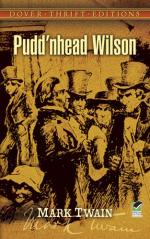With all her splendid common sense and practical everyday ability, Roxy was a doting fool of a mother. She was this toward her child—and she was also more than this: by the fiction created by herself, he was become her master; the necessity of recognizing this relation outwardly and of perfecting herself in the forms required to express the recognition, had moved her to such diligence and faithfulness in practicing these forms that this exercise soon concreted itself into habit; it became automatic and unconscious; then a natural result followed: deceptions intended solely for others gradually grew practically into self-deceptions as well; the mock reverence became real reverence, the mock homage real homage; the little counterfeit rift of separation between imitation-slave and imitation-master widened and widened, and became an abyss, and a very real one—and on one side of it stood Roxy, the dupe of her own deceptions, and on the other stood her child, no longer a usurper to her, but her accepted and recognized master. He was her darling, her master, and her deity all in one, and in her worship of him she forgot who she was and what he had been.
In babyhood Tom cuffed and banged and scratched Chambers unrebuked, and Chambers early learned that between meekly bearing it and resenting it, the advantage all lay with the former policy. The few times that his persecutions had moved him beyond control and made him fight back had cost him very dear at headquarters; not at the hands of Roxy, for if she ever went beyond scolding him sharply for “forgett’n’ who his young marster was,” she at least never extended her punishment beyond a box on the ear. No, Percy Driscoll was the person. He told Chambers that under no provocation whatever was he privileged to lift his hand against his little master. Chambers overstepped the line three times, and got three such convincing canings from the man who was his father and didn’t know it, that he took Tom’s cruelties in all humility after that, and made no more experiments.
Outside the house the two boys were together all through their boyhood. Chambers was strong beyond his years, and a good fighter; strong because he was coarsely fed and hard worked about the house, and a good fighter because Tom furnished him plenty of practice—on white boys whom he hated and was afraid of. Chambers was his constant bodyguard, to and from school; he was present on the playground at recess to protect his charge. He fought himself into such a formidable reputation, by and by, that Tom could have changed clothes with him, and “ridden in peace,” like Sir Kay in Launcelot’s armor.




